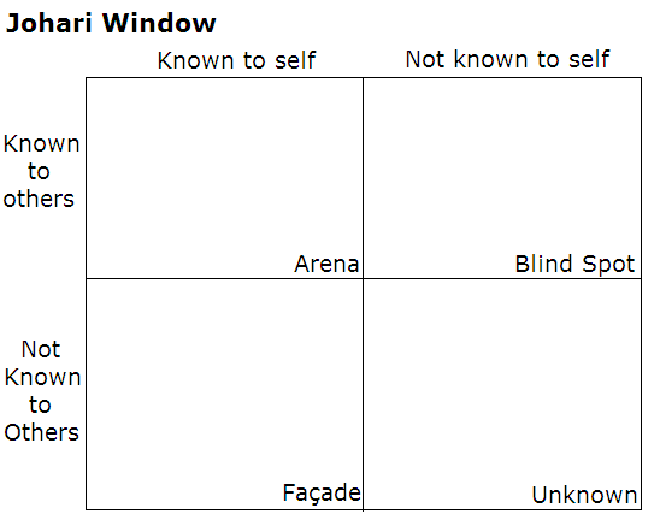How we see ourselves and how others see us are often very different things.
Joseph Luft and Harrington Ingraham created an exercise called the Johari Window (named by combining part of both of their first names, Jo + Harri/Hari) that can help bridge that gap.
In the Johari Window exercise, participants pick words from a list of adjectives that they feel describe their personality. Other folks who know them then get to pick an equal number adjectives from the same list to describe them.
All of these adjectives are plotted into a grid based on whether they were selected by the person to describe themselves, by others to describe them, both, or neither:

As you can see by the way the grid is laid out, these qualities are given different names depending on who identified them.
Adjectives that both the participant and others identified go into a quadrant called “arena.”
Ones that the participant chose but that others didn’t is known as either “hidden” or “façade”
A person’s “blind spot” in this exercise is predictably made up of adjectives that others selected but that they did not. Some of the most interesting self-insights can come from this quadrant.
And the final quadrant is called “unknown.” The adjectives that no one selected go here. While it could mean that the person doesn’t possess those qualities, that’s not necessarily the case. It’s also possible that they have those qualities but they’re both hidden to the person and those who know them.
The List of Traits Typically Used #
So… adjectives… that’s kind of vague. What exactly are we talking about? Well, here’s the list of adjectives that are typically used in the test (in alphabetical order):
- able
- accepting
- adaptable
- bold
- brave
- calm
- caring
- cheerful
- clever
- complex
- confident
- dependable
- dignified
- empathetic
- energetic
- extroverted
- friendly
- giving
- happy
- helpful
- idealistic
- independent
- ingenious
- intelligent
- introverted
- kind
- knowledgeable
- logical
- loving
- mature
- modest
- nervous
- observant
- organized
- patient
- powerful
- proud
- quiet
- reflective
- relaxed
- religious
- responsive
- searching
- self-assertive
- self-conscious
- sensible
- sentimental
- shy
- silly
- spontaneous
- sympathetic
- tense
- trustworthy
- warm
- wise
- witty
Whew, that’s a lot. But then again, it’s helpful to have some breadth in order to really dig into people’s personalities.
Where You Can Do the Johari Window Exercise Online #
If you’re interested in making your own Johari Window, thankfully it’s pretty easy. There’s even a convenient way to do it online ( here, click this link). You can select your qualities under a name of your choosing, and then you can send it to your friends and/or partners with your own unique link by posting it on social media or directly (texting, emailing, etc.), and they can select qualities for you — and set up one of their own (that you can also complete).
My friends group did this a while back, and it was a lot of fun… and yielded a lot of interesting information.
*
This post is part of an ongoing Poly Land feature called Psyched for the Weekend, in which I geek out with brief takes about some of my favorite psychological studies and concepts. For the entire series, please see this link.
*
My new book is out!
Dealing with Difficult Metamours, the first book devoted solely to metamour relationships, full of strategies to help you get along better with your partners’ other partner(s).

